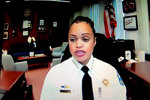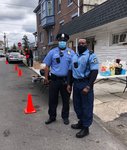The Mount Airy Community Council (MACC) held a spirited Zoom meeting with Police Commissioner Danielle Outlaw and other representatives from the 14th Police District to discuss crime prevention in the region.
This item is available in full to subscribers.
We have recently launched a new and improved website. To continue reading, you will need to either log into your subscriber account, or purchase a new subscription.
If you are a digital subscriber with an active subscription, then you already have an account here. Just reset your password if you've not yet logged in to your account on this new site.
If you are a current print subscriber, you can set up a free website account by clicking here.
Otherwise, click here to view your options for subscribing.
Please log in to continue |


The Mount Airy Community Council (MACC) held a spirited Zoom meeting with Police Commissioner Danielle Outlaw and other representatives from the 14th Police District to discuss crime prevention in the region.
Billed as a Community Conversation, the meeting was expertly facilitated by co-hosts Nafakha Muwwakkil and Tonyelle Cook-Artis, members of MACC. They had originally arranged for a conference for up to one hundred participants, but as the conference filled up in the first three minutes, they quickly pivoted and expanded the service to admit others, including some of the police officials who were still trying to opt in. The problem was quickly fixed and a resulting 135 people participated in the call.
While Commissioner Outlaw was the main draw for the crowd, a number of other speakers shared comments and critical information before the Commissioner was in the “hot seat.”
City Councilmember Cherelle Parker combined the passion of a community activist with the diplomacy of a political official as she urged the citizens on the call to remain actively engaged. Speaking to the members of MACC as well as area block captains and contact people in the 50th Ward, she said, “You are the heart, soul, spirit, and vein that keeps this community going.” She praised an effort by Black men from Enon Tabernacle Baptist Church who, she said “made the 1400 Block of Vernon Road, where a young man was killed, their second home for a long period of time,” while other church members set up security cameras in the area.
“It will take all hands on deck,” Parker said. “We won’t be able to just leave it to the police.”
From the Police officials, Parker asked specifically for information about what she called “hot spots.” Directing her comments to Outlaw, she said “Commish…Can we put together a list of hot spots? Areas where we know that violence will occur? Can we make those locations public and then make a very public call for community members, churches, mosques, etc., to be present?”
Facilitator Cook-Artis agreed. “We want to know what we can do. How can we empower each of the blocks in the 19150 area so we can assure public safety?
Commissioner Outlaw was fully supportive of community engagement in public safety efforts. Offering what she called a “high level” update on law enforcement activity in the City, she specially mentioned a program called “Operation Pin Point” which does exactly what Council Person Parker proposed.
There are hotspots in the City that the Department reports on, Outlaw said. “We do pressers every two weeks,” she said to report on police efforts to stop crime. She reminded the audience that even with pinpointed trouble areas, “We can’t sit on every block all the time.”
Outlaw said that the PPD efforts in the pinpoint areas have resulted in a decrease in criminal activity. “The goal in the long term is to see a 25% decrease in crime overall as a result of our efforts.” She acknowledged that they are seeing some positive trends, but that “we might not see them in the short term,” citing the approach of warmer weather and anticipation of demonstrations after office involved shootings in Chicago and Minnesota. The department was also preparing for potential demonstrations after the verdicts in the Derek Chauvin trial are announced.
The Commissioner answered a question about the joint federal and City initiative to prevent crime. Outlaw said that they have a very good relationship with federal partners. She hopes that their talks will result in the ability of federal prosecutors to go after what she called “heavy hitters,” so that those who commit the most violent crimes, and commit repeatedly, will get more serious sentences.
Another citizen asked how police can change their interactions so that people are not afraid to interact with the police, specially referring to racial bias.
Outlaw said there are ongoing conversations about “reimagining” police work. She sees the value in hiring community service officers, and offering other ways to be present and mediate conflict which don’t necessarily require a police officer. However, she explained, “We can’t replace police officers without contractual negotiations.”
Referring to racial discussions within the force, she admitted, “We have a dissonance internally. We have to have difficult conversations; we have to hear things that are uncomfortable. Quite frankly, we have to follow through.”
Outlaw said that the year 2021 will be about how the department puts positive changes in to action. She did not promise perfection, and instead said that “When we mess up, and we will, we own it.”